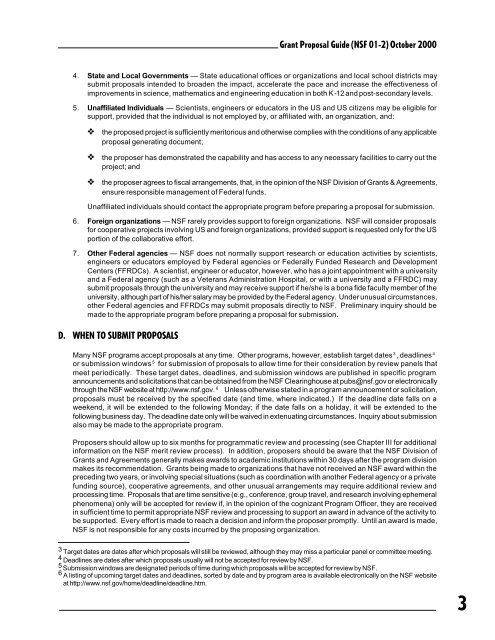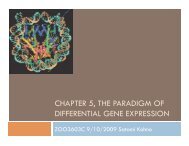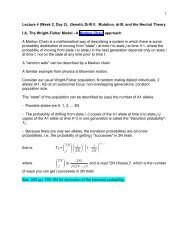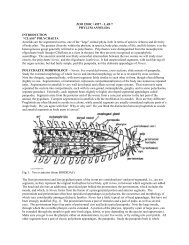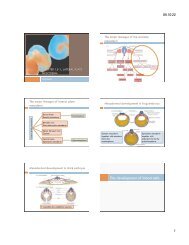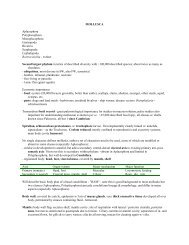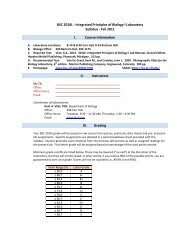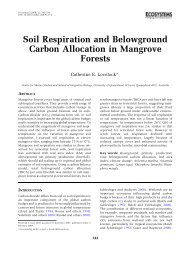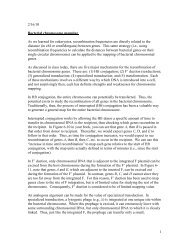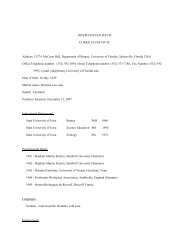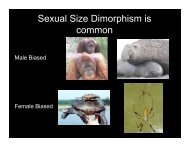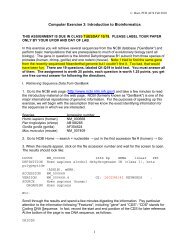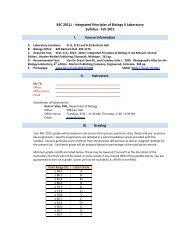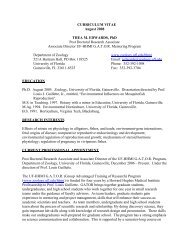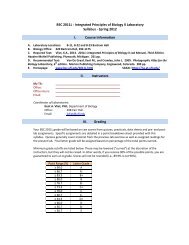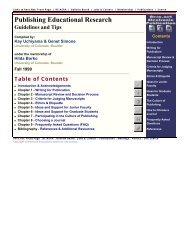NSF 01-2 - Grant Proposal Guide - Department of Biology
NSF 01-2 - Grant Proposal Guide - Department of Biology
NSF 01-2 - Grant Proposal Guide - Department of Biology
You also want an ePaper? Increase the reach of your titles
YUMPU automatically turns print PDFs into web optimized ePapers that Google loves.
<strong>Grant</strong> <strong>Proposal</strong> <strong>Guide</strong> (<strong>NSF</strong> <strong>01</strong>-2) October 2000<br />
4. State and Local Governments — State educational <strong>of</strong>fices or organizations and local school districts may<br />
submit proposals intended to broaden the impact, accelerate the pace and increase the effectiveness <strong>of</strong><br />
improvements in science, mathematics and engineering education in both K-12 and post-secondary levels.<br />
5. Unaffiliated Individuals — Scientists, engineers or educators in the US and US citizens may be eligible for<br />
support, provided that the individual is not employed by, or affiliated with, an organization, and:<br />
❖ the proposed project is sufficiently meritorious and otherwise complies with the conditions <strong>of</strong> any applicable<br />
proposal generating document;<br />
❖ the proposer has demonstrated the capability and has access to any necessary facilities to carry out the<br />
project; and<br />
❖ the proposer agrees to fiscal arrangements, that, in the opinion <strong>of</strong> the <strong>NSF</strong> Division <strong>of</strong> <strong>Grant</strong>s & Agreements,<br />
ensure responsible management <strong>of</strong> Federal funds.<br />
Unaffiliated individuals should contact the appropriate program before preparing a proposal for submission.<br />
6. Foreign organizations — <strong>NSF</strong> rarely provides support to foreign organizations. <strong>NSF</strong> will consider proposals<br />
for cooperative projects involving US and foreign organizations, provided support is requested only for the US<br />
portion <strong>of</strong> the collaborative effort.<br />
7. Other Federal agencies — <strong>NSF</strong> does not normally support research or education activities by scientists,<br />
engineers or educators employed by Federal agencies or Federally Funded Research and Development<br />
Centers (FFRDCs). A scientist, engineer or educator, however, who has a joint appointment with a university<br />
and a Federal agency (such as a Veterans Administration Hospital, or with a university and a FFRDC) may<br />
submit proposals through the university and may receive support if he/she is a bona fide faculty member <strong>of</strong> the<br />
university, although part <strong>of</strong> his/her salary may be provided by the Federal agency. Under unusual circumstances,<br />
other Federal agencies and FFRDCs may submit proposals directly to <strong>NSF</strong>. Preliminary inquiry should be<br />
made to the appropriate program before preparing a proposal for submission.<br />
D. WHEN TO SUBMIT PROPOSALS<br />
Many <strong>NSF</strong> programs accept proposals at any time. Other programs, however, establish target dates 3 , deadlines 4<br />
or submission windows 5 for submission <strong>of</strong> proposals to allow time for their consideration by review panels that<br />
meet periodically. These target dates, deadlines, and submission windows are published in specific program<br />
announcements and solicitations that can be obtained from the <strong>NSF</strong> Clearinghouse at pubs@nsf.gov or electronically<br />
through the <strong>NSF</strong> website at http://www.nsf.gov. 6 Unless otherwise stated in a program announcement or solicitation,<br />
proposals must be received by the specified date (and time, where indicated.) If the deadline date falls on a<br />
weekend, it will be extended to the following Monday; if the date falls on a holiday, it will be extended to the<br />
following business day. The deadline date only will be waived in extenuating circumstances. Inquiry about submission<br />
also may be made to the appropriate program.<br />
Proposers should allow up to six months for programmatic review and processing (see Chapter III for additional<br />
information on the <strong>NSF</strong> merit review process). In addition, proposers should be aware that the <strong>NSF</strong> Division <strong>of</strong><br />
<strong>Grant</strong>s and Agreements generally makes awards to academic institutions within 30 days after the program division<br />
makes its recommendation. <strong>Grant</strong>s being made to organizations that have not received an <strong>NSF</strong> award within the<br />
preceding two years, or involving special situations (such as coordination with another Federal agency or a private<br />
funding source), cooperative agreements, and other unusual arrangements may require additional review and<br />
processing time. <strong>Proposal</strong>s that are time sensitive (e.g., conference, group travel, and research involving ephemeral<br />
phenomena) only will be accepted for review if, in the opinion <strong>of</strong> the cognizant Program Officer, they are received<br />
in sufficient time to permit appropriate <strong>NSF</strong> review and processing to support an award in advance <strong>of</strong> the activity to<br />
be supported. Every effort is made to reach a decision and inform the proposer promptly. Until an award is made,<br />
<strong>NSF</strong> is not responsible for any costs incurred by the proposing organization.<br />
3 Target dates are dates after which proposals will still be reviewed, although they may miss a particular panel or committee meeting.<br />
4 Deadlines are dates after which proposals usually will not be accepted for review by <strong>NSF</strong>.<br />
5 Submission windows are designated periods <strong>of</strong> time during which proposals will be accepted for review by <strong>NSF</strong>.<br />
6 A listing <strong>of</strong> upcoming target dates and deadlines, sorted by date and by program area is available electronically on the <strong>NSF</strong> website<br />
at http://www.nsf.gov/home/deadline/deadline.htm.<br />
3


